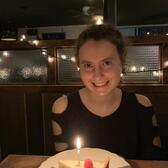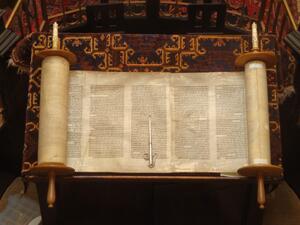Torah Reading Between the Lines
A few Saturday mornings a month, my Dad and I go to synagogue to read Torah. We drive there, even though my synagogue is within walking distance; my Dad often has errands to run, or I have a dance class I need to make, two activities that cannot be accomplished efficiently through walking. We pull into the parking lot, pry open the synagogue’s heavy wooden doors, and take our seats at the very back of the sanctuary. Within thirty minutes, as the Torah is being lifted in the air for the ritual of hagbah, we are out of there. The Bayroff duo vanishes into the crisp morning, and as I hear the haftarah, the Torah portion-related bible passage of the week, issue from the speakers, I feel like an action hero running from a building about to blow. “We are such bad Jews,” I mumble to my Dad, who responds with a shrug.
My religious identity is complicated. Though I have attended Jewish Day School my whole life, very little of the day-to-day observance of the Jewish law I’ve been taught has actually been carried into the way I live my life. My family does not keep kosher, and does not observe the rules and prohibitions of Shabbat. We celebrate most of the major holidays, but we do it mostly to be a part of our Jewish community and sustain our traditions, and are not strict in our practice. Years ago, when I asked my Mom about why our family was more lax than some of our friends when it came to keeping the faith, she said something along the lines of this: “Look Eliza, there’s no need to feel guilty. Be proud you’re Jewish, marry Jewish, be a good person, and I know in my heart that God won’t care if you ate bacon and drove on Shabbat.”
I didn’t totally believe her then, and I’m still not really sure what to make of the conflict I feel over my family’s practices. But throughout all my wayward soul-searching, I have always been certain of my identity: I am a Jew, and I am feminist who supports the empowerment of women. When I read Torah, these two sides of me are married together in almost perfect harmony. When I read Torah, no matter if my faith happens to be waxing or waning, I go up to bimah, or stage, of the synagogue, bend over the huge Torah scroll, and quietly scramble to match the right tune with the right word at the right time, as if I am performing the world’s most complicated aria.
As it turns out, reading before my congregation on Saturday mornings gives me far more pride in being a young woman than almost anything else in my life. I go to a conservative synagogue, where girls weren’t allowed to have a regular Saturday morning Bat Mitzvahs, complete with Torah readings, until ten years ago. Before the first girl broke that barrier—herself a former student of my school, Solomon Schechter High—women there did not take part in services at all. It hurts to realize that not very long ago, all women—not just the ones at my synagogue—were barred from the excitement and satisfaction of sitting on the couch late at night with a tikkun (practice book for Torah reading) on their lap, chanting words written thousands of years before they were born, in a tune sung somewhere in the old country centuries ago by long-deceased ancestors. The ancient Hebrew words, like a leather-bound time machine, take me backwards through the years. It is, simultaneously, the most natural and intense religious experience I have ever had— even more meaningful to me than when I visited Jerusalem’s Western Wall, arguably Judaism’s most holy place, as a little girl. Most weeks when I read on the bimah, I am surrounded on all sides by men my Dad’s age. They are nothing but lovely, complimenting my skill and patting me on the back, but their presence reminds me that my ability to do this is a privilege that women have not enjoyed for very long. My mom, and most women of her generation, never even had a shot at this experience: one I too often take for granted, or, on the occasions when I am exhausted or swamped for time, resent.
But my Torah reading blues never last for long, and whatever the problems and inconveniences of my day-to-day life, I keep coming back to it. Usually, when I finish reading and walk back down the aisle to my seat, some of the elderly congregants lean over to shake my hand. Impressed with this girl who can lein (chant Torah), they reach out to me with wrinkled hands and whisper, “So you go to a Yeshiva?” “Day School,” I reply, nodding vigorously. “Good for you!” they say, and I smile. Good for me, indeed.
This piece was written as part of JWA’s Rising Voices Fellowship.








i like this alots.
Thanks for this Eliza. And know that many of us who could not leyn Torah when we were young are now leyning with the same joy that you feel. So, as one Ba'alat Kriah to another---Yashar Kochech!!